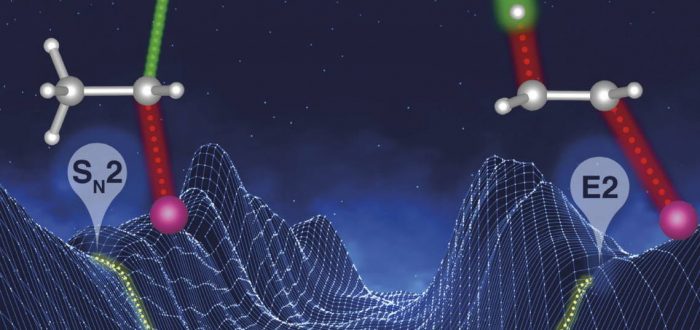Recently, in collaboration with Matthias Bickelhaupt and co-workers from the VU University Amsterdam, a new paper was published by Marcel Swart on the competition between bimolecular substitution vs. elimination pathways. Model systems of X(-) and C2H5Y (X,Y = F, Cl, Br, I, At) were used to explore the nucleophilicity and protophilicity, at the ZORA-OLYP/TZ2P level
- sec.iqcc@udg.edu
- +34 972 41 83 57
News
S’apropa la Nit de la Recerca que com cada any està plena d’activitats. Des de Institut de Química Computacional i Catàlisi (IQCC) (@IQCCUdG http://iqcc.udg.edu/) de la Universitat de Girona (@univgirona) hem organitzat l’activitat “Què fa un investigador a l’IQCC?” adreçada a estudiants de batxillerat. El proper 27 de Novembre de 12h a 13h, de manera
Next Thursday, 26 november, 15.30-17.30h, will take place the Autumn edition of the IQCC Forum, a quarterly meeting-place where high-quality science will be discussed. The IQCC Forum provides the opportunity for young researchers (and more advanced researchers) to present their work to a wide audience. This will lead to better knowledge of the work that
Dr. Marco Bortoli has recently become a new member of the Institute of Computational Chemistry and Catalysis (IQCC). Dr. Bortoli did his PhD in Università degli Studi di Padova and Vrije Universiteit Amsterdam on the role of selenium in glutathione peroxidase: insights from molecular modeling under the supervision of Prof. F. Matthias Bickelhaupt and Prof.
Dr. Hugo Valdés has recently become a new member of the Institute of Computational Chemistry and Catalysis (IQCC) with a CONACyT and Beatriu de Pinós fellowships. Dr. Valdés did his PhD in University of Jaume I on studies on determined the effect of ?-? stacking additives on the catalytic activity of N-heterocyclic carbene complexes with extended
Last Friday November 23rd at the IQCC Council meeting we approved the recognition of Dr. Marc Garcia-Borràs as as Principal Investigator of the institute. Marc and his team will be leading the following research line: “Biocatalytic intermediates for the discovery and design of new enzymatic activities”. In the coming days this new situation will be reflected on
Chemical Communication features on its front cover the recently published article “All-metal Baird aromaticity”. The work has been carried out by Prof. Jun Zhu at the University of Xiamen and Dandan Chen, Dr. Dariusz W. Szczepanik, and Prof. Miquel Solà (members of the IQCC). The cover is the result of the artistic inspiration of Dandan Chen. The
Dr. Ramon Carbó-Dorca Carré will turn 80 next Monday, November 19, 2020. On the occasion of this special day, in his capacity as Emeritus Professor of the University of Girona, he will give an online Master Class. Ramon Carbó-Dorca joined the university studies of Girona in 1986, quickly became a Professor, and was one of
At this moment is taking place at the Palau de la Generalitat in Barcelona the award ceremony for the 2019 Catalonian National Research Awards. Among the awardees is Sílvia Osuna in the category for Young Talent. Below we reproduce (with permission) the translation of an interview that Xavi Aguilar held with Sílvia, and which was published last week
What is a chemical bond? The chemical bond is a central concept for describing and predicting molecular structure and reactivity. Since a chemical bond does not have an operator in quantum mechanics, there is no exclusive approach to describe it unequivocally. A fundamental approach towards understanding its properties consists in classifying the electron-pair interactions between










